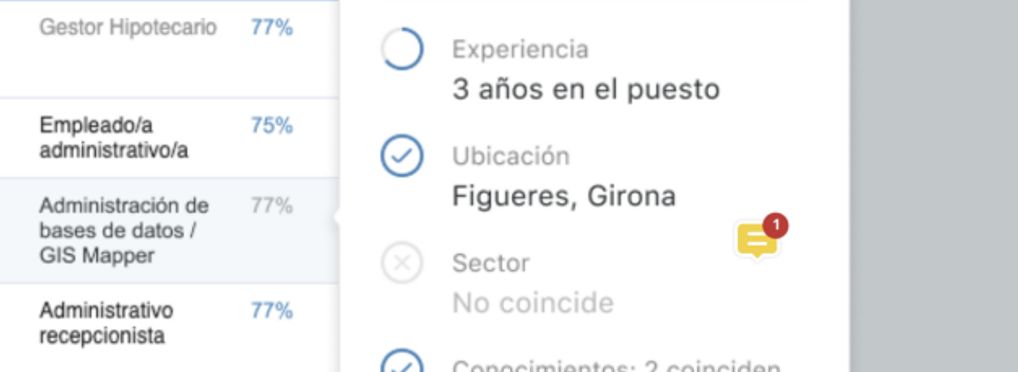These tools and metrics are designed to help AI actors develop and use trustworthy AI systems and applications that respect human rights and are fair, transparent, explainable, robust, secure and safe.
How You Match functionality in InfoJobs

InfoJobs, one of the brands of Adevinta, is the leading Job Board in Spain with more than 11M candidates’ CVs. We have been connecting people and jobs for 25 years. In 2022 we had 2.7M job vacancies posted and more than 125M registered applications. As a company, our primary objective is to help our users find perfect matches. This means finding the best offers for our job seekers, and the best candidates for our job publishers. The functionality we introduce, named “How You Match”, is designed to offer relevant information both to the candidate looking for a job and to the recruiter looking for specific profiles.
How You Match score is computed using a heuristic approach that combines multiple factors. These factors have been selected according to business knowledge and include: years of experience in a relevant position, location, level of studies, sector, languages, and skills. This matching score is used in different user touchpoints within Infojobs. For instance, it is shown to candidates in the offer detail in order to help them understand how the offer fits with their profile. The given information may help candidates decide whether to apply or not and may also encourage them to update their CVs in case relevant information is missing. Recruiters can also see the matching score of the candidates that have applied to their job offers and they can optionally use this information to sort the applicants, although the default order is based on application date.
In all cases, explainability is enforced for this functionality, and the details for each matching score are always provided.
Benefits of using the tool in this use case
- In this use case, we present how the How You Match functionality was able to pass Adigital’s certification on algorithmic transparency. For InfoJobs, given our role in the Spanish employment market, providing evidence that shows that the work undertaken thus far in AI has been carried out responsibly and ethically is extremely relevant. Therefore, certifications such as the one provided by ADigital are very beneficial.
- One of the main benefits we found in the tool was the end-to-end support from Adigital, and the possibility to share further context on the company's reality and needs, to help ensure the certificate is valuable, usable, and clear from the company's side. Even if this topic is hard to cover as there aren’t clear guidelines and frameworks to follow, this certification offered us, for the first time, clear guidelines and checks that are relevant to ensure in our processes. Even if we understand passing this certification is not enough to ensure responsible use of technology, it was really helpful as a guided way to start on the topic and gain initial knowledge and awareness.
- A second benefit was that this certification forced a cross-functional collaboration within the company, between product, tech, legal, privacy, communication, and others. This is important as this type of cross-collaboration usually doesn’t happen, but helped generate internal awareness on the topic (even outside the ML or data teams) and share knowledge and learnings across teams.
- A third benefit is that it provided an end goal and deadline to generate proper documentation that, on top of that, had to be validated and understood by people outside the company.
Shortcomings of using the tool in this use case
- We often struggled between the system and the model’s boundaries. As the system is the whole functionality, and the model is only one piece where ML/AI actually applies, this distinction was important but sometimes hard to summarise in responses (e.g. what happens if the system is explainable, but the ML model piece isn’t).
- It is still unclear the relationship between this certificate and regulations such as GDPR or AI Act. It would be especially relevant for the company to understand if a certification like this one is sufficient with respect to AI Act compliance in the future.
- Even if Adigital provided end-to-end support on our work related to the certification, we see there is a general lack of actual tools or advice on how to get or implement all points. For example, what are must vs nice to have analysis when checking for representation, and which are appropriate thresholds to consider a result as good.
Learnings or advice for using the tool in a similar context
- Passing the certification was relatively easy for us because the System had been implemented with explainability and transparency by design from the very beginning. We realized that if it hadn’t been the case, trying to solve issues when already in production would have been much more complicated and time-consuming.
- Getting the buy-in from top management ensures that the organization is committed and ready to allocate resources to reach the goals of the initiative.
Comparison with other tools
No, it was key for us the fact that this tool was the first of its kind in Spain.
About the use case
You can click on the links to see the associated use cases
Objective(s):
Impacted stakeholders:
Purpose(s):
Target sector(s):
Country/Territory of origin:
Target users:




























